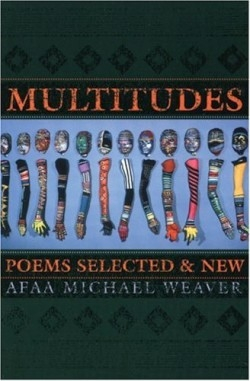
Multitudes
Poems Selected & New
Weaver’s blue-collar background still shows in some of his poems. He spent fifteen years working in a factory before returning to college, eventually earning a M.F.A. and holding an endowed chair at Simmons College. When he writes of his father and uncles on the weekends with “their lungs still feeling / the scratch of the soot they took for air” his words speak of firsthand knowledge. It is, however, this grounding in reality that makes his verse resonant with truth, even when exploring the abstract.
Weaver (formerly Michael S. Weaver) is a versatile poet, trying out a variety of forms and themes in his work. One can hear the influence of Pablo Neruda, Traherne, John Ashberry, as well as Langston Hughes and Michael S. Harper (with whom he studied). Among his stronger poems are those explorations of the effect of the Great Migration on friends and family members (and their children) who along with over six million other African-Americans left their homes in the South and headed north lured by the promise of better pay and work in the factories. His work moves from a lyric of the personal to a lyric of the culture, but it is always a representation of a genuine African-American culture and not some mythic vision perpetuated by tee-shirt salesmen and political self-promoters.
This collection contains samples from all of Weaver’s previous five collections of poetry, along with twenty-three previously uncollected works. The new works reveal the continued vitality of Weaver’s voice and his explorations of form. “The Poets” and “Mojo Mamba” are two of his best. “The Poets” describes a basketball game between rival high schools, the nearly all black Dunbar High Poets and the poet’s own predominately white school. The poem becomes a modern manifestation of the continuing existence of W. E. B. DuBois’s notion of the double consciousness of African-Americans living in a society that imagines itself as white and sees others as exotics.
For those unfamiliar with Weaver’s work, this collection provides a fine introduction to the work of an author whose literary reputation will continue to grow. For those already familiar with his previous work, the volume is still worthwhile for the new works included and the insightful introduction by Arnold Rampersad.
Reviewed by
Erik Bledsoe
Disclosure: This article is not an endorsement, but a review. The publisher of this book provided free copies of the book to have their book reviewed by a professional reviewer. No fee was paid by the publisher for this review. Foreword Reviews only recommends books that we love. Foreword Magazine, Inc. is disclosing this in accordance with the Federal Trade Commission’s 16 CFR, Part 255.
